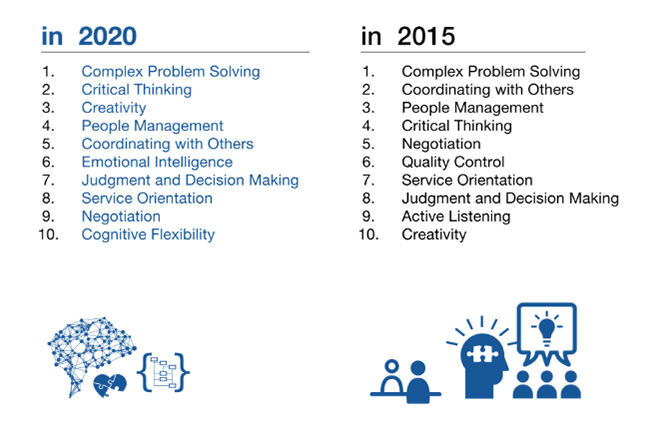Emotional Intelligence - What is it and why is it Important for your Business?
Updated September 21, 2018 - Tom Jager
Undoubtedly, an effective leadership is critical for achieving business goals. In the modern workplace characterized by open communication and teamwork, a leader must understand their followers and know how to motivate them properly.
That’s why the business world has been paying an increased attention to “emotional intelligence”, a term first coined in the 1960s by researchers Peter Salovey and John Mayer. This ability has been recognized as an important one to succeeding as both a leader and an employee and achieving business goals more effectively.
For example, The Future of Jobs, a recent report published by the World Economic Forum, named emotional intelligence as one of the top 10 skills desired by employees by 2025.
In this article, let’s explore emotional intelligence more in-depth and define why it’s so important for your business.
What is Emotional Intelligence (EI)?
According to The Future of Jobs, emotional intelligence is defined as “being aware of others’ reaction and understanding why they react as they do.” Also, it’s the ability to identify and manage own emotions.
Daniel Coleman, one of the most prominent advocates of the concept who wrote Emotional Intelligence: Why it Can Matter More than IQ, define five crucial skills of emotional intelligence. They include:
Self-awareness – the ability to identify and understand emotions of other people and the ways how they impact others around them
Self-regulation – the ability to think before acting and manage impulses
Internal motivation – the drive to achieve goals for personal reasons, not for rewards and recognition
Empathy – the ability to identify and understand motivations of other people
Social skills – the ability to effectively manage relationships and build teams.

Why is emotional intelligence important for businesses?
So, the concept of emotional intelligence says that personal qualities such as the ones listed above strongly influence both personal and business success in the modern workplace.
"In terms of businesses, it can impact everyday decisions they make, including hiring, promoting, leading, and firing," explains Mike Booker, an HR consultant. "On the other hand, in terms of personal success, a leader possessing emotional intelligence knows how to handle failures, motivate followers, and maintain self-control in critical situations."
In fact, Jack Welch once said in an interview to the Wall Street Journal:
"A leader’s intelligence has to have a strong emotional component. He/she has to have high levels of self-awareness, maturity and self-control."
Let’s begin by discussing how assessing emotional intelligence of your existing and potential employees could improve the performance of your business.
Benefits of emotional intelligence in the workplace
Multiple organisations use EQ to make important decisions, such as, hiring employees and deciding on pay rises. The World Economic Forum (2016) ranked emotional intelligence sixth in the top ten skills employees need by 2025 to succeed in the future workplace.
Other benefits of being an emotionally intelligent leader include:
- Providing effective communication
- Predicting staff reactions to negative news and aptly preparing for this
- Effectively listening
- Successfully managing difficult situations
- Recognising potential mental health risks to staff
- Making employees feel comfortable in sharing ideas and concerns with you
- Remaining optimistic and having a positive attitude
- Gaining trust and loyalty quickly which subsequently increases staff performance
- Being empathetic and compassionate towards staff and clients
- Remaining calm and handling pressure effectively
- Being open to positive and negative feedback
- Influencing and inspiring staff which helps when trying to gain support for future projects
- Motivating yourself and your staff
- Resolving conflict fairly

World Economic Forum (2016) ranked emotional intelligence sixth in the top ten skills employees need by 2025.
The impact on emotional intelligence on employee performance
There are many ways in which emotional intelligence influences performance of employees, and the evidence of that influence is well-known. For example, business scholars have conducted a number of studies probing the topic and here’s what they found.
Earlier studies like this one from CareerBuilder found that 71 percent of employers (HR professionals and hiring managers) viewed emotional intelligence more important than IQ. When asked why they thought that way, employees with high EI:
- Admit and learn from their mistakes
- Possess excellent conflict resolution skills
- Are more likely to remain calm under pressure
- Tend to make more thought-out business decisions
- Take criticism well
- Keep emotions in check
These results are supported by more recent studies. For example, this 2017 study published in Human Performance Journal also found that emotional intelligence was a predictor of job performance in social jobs. Researchers also believed that emotional intelligence came naturally to some people, but could also be enhanced in others with training and performance.
Therefore, by assessing emotional intelligence in potential employees and improving these skills and abilities in the current ones, you may improve job performance of your workforce. You can find resources for testing and tips on developing emotional intelligence after the next section.
The impact of emotional intelligence on quality of leadership
Possessing emotional intelligence enables leaders to better understand and motivate people who follow them because of these reasons.
- Leaders with high EI understand the significance of communicating effectively with followers
- Leaders with high EI tend to treat all employees with respect
- Leaders with high EI are more likely to understand and emphasize with the emotions that influence attitudes and behaviors of followers
- Leaders with high EI are able to identify and healthfully express their emotions instead of allowing them to run wild
- Entrepreneurs with high EI are more likely to emphasize with customers, therefore, identify their needs more effectively.
This is why emotional intelligence is important to leaders and entrepreneurs. Having these qualities can do wonders for productivity, performance, HR management, and ultimately profitability for all.

Low emotional intelligence
These traits are common in individuals with low emotional intelligence:
- Blaming others for mistakes
- Reacting badly to negative feedback
- Not handling stress effectively, such as, shouting at staff
- Criticising others
- Not listening to others' viewpoints
- Lacking empathy
- Avoiding socialising with colleagues
- Using either passive, aggressive or passive-aggressive communication
How to improve your emotional intelligence
- Keep track of emotions you’re feeling throughout the day. How do they impact the way you respond to others? Answering this question will make you more aware of your emotions.
- Take time to think before making any work-related decisions. Often, emotions interfere with the ability to consider all options, so keep your cool and give yourself some time to think.
- Develop active listening skills. They involve asking questions, showing attention, and providing feedback to the other person.
- Try viewing situations from the point of view of others. It would be an excellent first step toward finding a common ground between two opposing points.
- Try to maintain a positive attitude. Focus on what you love and build your intrinsic motivation, and you’ll become more optimistic.
There are many ways in which you can improve the five crucial skills of emotional intelligence (self-awareness, self-regulation, internal motivation, social skills, and empathy), including the following.
Free online emotional intelligence tests
If you feel like testing your emotional intelligence, feel free to check out the following resources:

